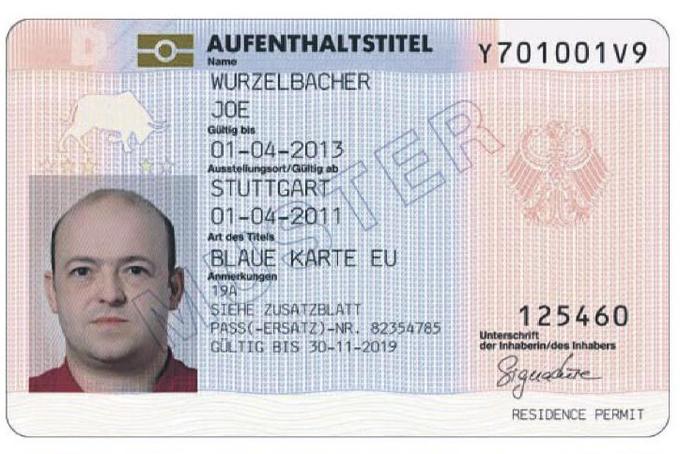
version


The blue card was created in analogy with the American Green Card. But the EU Card is aimed at experienced specialists.
The reason for this "generosity" on the part of Europe is the aging of the population, and therefore lack of personnel in certain fields. Only Ireland, Denmark and the UK declined the project. In other countries, the conditions for obtaining the Blue Card are very similar.
To become a happy Blue card holder, you only need to meet three conditions (in addition to being a non-EU citizen).
Higher education is required, and the term of study is at least three years with the assignment of a specialist or master's degree. Moreover, your diploma must correspond to the European diploma in the specialty in question of the country you are going to for employment.
For example, you can view the list of universities that meet the requirements of the Blue card. If your school is not in the database, you will have to make a confirmation of the diploma. Details about this procedure are described on the local website of the Ministry of Migration or Education. For example, for Germany you can find it here, and here are the terms for Finland. There is also a separate official website of the European Union, where all the necessary contacts are provided to get advice on diploma recognition, Blue Card specialties, etc. And FAQ with answers to the most common questions.
In some countries, a mandatory requirement in addition to higher degree is work experience in the relevant specialty, which you can prove. If your specialty is particularly in demand, a proven work experience of at least five years can replace a degree diploma.
It is not enough to have education in a popular profession to get the Blue Card, you also need to have an employment contract with a potential place of work for at least a year.
Moreover, the guaranteed level of remuneration is fixed for each specific country. For example, the minimum for Germany is €49,600 per year and at least €38,688 for specialists who are particularly in demand in the country (engineers, doctors, IT, etc.), for Finland it is €4,809 per month, for the Czech Republic – €18,300 per year, Spain – €33,908, and Poland – €1,366 per month. This level changes every year.
Highly qualified specialists who want to get the Blue Card are assisted not only by a single country, but also by the European Union as a whole, helping to find potential employers and establish communication with them. For this purpose, the website of the European Community contains detailed information for those who want to live and work in Europe. Here you can find conditions for employment, a list of popular professions and the minimum salary threshold, as well as visit the websites of each individual country participating in the program.
There are also a number of portals where you can learn about the labor market and the specifics of moving to a particular country separately, here are a few links: Germany, the Czech Republic, Austria, the Netherlands, Finland and Spain.
To start, we recommend you to engage in a passive job search: fill out an electronic questionnaire on the website of the EU or the country where you want to move, specify as much information as possible about your education, professional skills and work experience. Your data will be included in the database after publication and available to potential employers from the moment on. The employer will be able to contact you, conduct an online interview or invite you to a face-to-face interview.

A specific list of relevant professions is compiled by the Ministry of Labor of each country. Despite the fact that the exact specialties may vary, there are areas where highly qualified employees are always in demand in the EU labor market:
Despite the fact that knowledge of a language is not mandatory criteria, such a skill will be a significant advantage for you.
A Blue Card holder, unlike an immigrant who receives a regular residence permit, has a number of advantages.
First of all, a highly qualified specialist is entitled to the same working conditions and salary as EU citizens. The minimum payment threshold for getting the Blue Card is lower, although it is about 1,5 times higher than the national average.
There is an advantage for the employer as well: they do not have to prove to the Employment Agency that they should accept you just because there was no suitable candidate in their home country. This means that the deadline for approving documents is shortened, and your chances of getting an entry permit increase. In addition, there are no requirements for knowledge of the local language (unless your profession requires it).
If the contract with the specified company has ended, the Blue Card holder has three months to find a new job. Moreover, you can search in another country: after 1,5 years you can exchange your existing certificate for the Blue Card of any other country included in the program, if you have an employment contract with the employer there.
Also read:
Work in the Netherlands: How to Find a Job and How Much You Can Earn
Work in Turkey: Where to Find, How to get a Job and How Much Can You Earn?
Working in Finland: How to Find, What Position to Choose and How Much You Can Earn
The Blue Card simplifies the process of moving a spouse: they are issued a residence permit with the right to work even without a contract and knowledge of the local language. Moreover, there are no restrictions on the specialty.
With the Blue Card, you can easily move around the territory of the European Union for tourism, recreation and study. The maximum period of continuous stay in another country is 12 months without losing the existing residence permit.
The period after which you can apply for permanent residence is also reduced: you can apply for permanent residence in 21 months. But you must make contributions to the Pension Fund all this time, and the procedure for reviewing documents includes passing an exam for knowledge of the local language. If you don't want to prove your language skills, you can wait another year and apply for permanent residence in 33 months.
If you do not already reside in the European Union, you must first obtain a work visa before getting a Blue Card. After entering the country and before the visa expires, you need to submit documents for issuing the Blue Card to the local migration office.
A potential Blue Card participant will need to collect and submit the following documents:
If you have collected a full package of documents, you will receive a response about getting the Blue Card in 12 weeks maximum. Often, if you did everything correctly, the notification may come earlier: in 8-9 weeks. A positive response is published on the official website, a negative one is reported to the potential employer, after which the latter tells the candidate about the decision.
The Blue Card is valid for up to four years from the date of issue, provided that the employment contract is concluded for a new period. If the contract is valid for less than four years, the card is issued for the period specified in it plus three months. If you decide to change your job within the first two years, you will first have to coordinate your decision with the office for foreigners.
Getting the Blue Card is not an impossible task. All you need is perseverance in collecting and approving documents, perseverance in finding a job and having an education in the relevant profession in the EU countries. But in return, you will get the opportunity not only to earn decently in your favorite profession, but also to move to a new place in the company of close relatives, travel freely around the European Union and, if desired, get permanent residence without much effort. This results do worth it.





